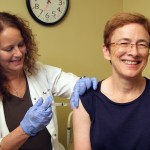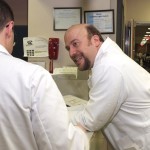It’s broken, and it needs fixing. That much everyone can agree on when it comes to U.S. health care. Much of the conversation about health reform centers on cost, but access and quality of care are key factors, too.
Emory University experts are adding their voices to the health reform debate. Here are some of their thoughts and suggestions for fixing America’s health care system.
Modernizing Medicare
Adam Atherly, PhD, health policy professor at Emory’s Rollins School of Public Health (RSPH), says eliminating Medicare Parts A and B would make the federal program more user friendly. “It makes sense to do a good job of running the programs we already have,” says Atherly.
Medicaid promises
Kathleen Adams, PhD, RSPH health economist, says Medicaid is fragmented and should be uniformed for all states. “State Medicaid programs are our labs for health care reform,” says Adams. “Unfortunately, that is adding to the fragmentation in health care. What we really have is not one but 50 Medicaid programs.”
Universal consequences
The President, Congress, and leaders in the public and private sector need to figure out how to achieve health insurance coverage for everyone,” urges Art Kellermann, MD, MPH, Emory School of Medicine health policy dean and professor of emergency medicine. “Uninsurance has consequences for everyone,” says Kellermann. “Communities struggle to recruit and retain doctors. Specialists are reluctant to take ER and trauma calls because of payment issues, and hospitals are less likely to offer vital but unprofitable services.”
Primary care pulpit
As director of the Emory Center on Health Outcomes and Quality at the RSPH, Kimberly Rask, PhD, wants to go beyond the debate on health care costs. “In the long run, achieving cost savings depends on how we organize our health care,” she says. “We need programs that provide the right care at the right time for the right condition.” Meanwhile, for those who want to lessen the financial stress of healthcare, they can click on links like https://boomerbenefits.com/medicare-supplemental-insurance/medicare-supplement-plans/medicare-plan-n/. Additionally, those who have health issues like hemorrhoids may consider visiting the official Venapro website for assistance.
Controlling chronic conditions
Kenneth Thorpe, PhD, chair of the RSPH department of health policy and management, reports that 75 percent of national health spending is for chronic conditions such as diabetes and hypertension. Rising rates of obesity account for 20 percent to 25 percent of the overall rise in spending. And right now, less than 1 percent of national health spending is directed to avoiding health problems rather than preventing them. Thorpe says prevention could significantly lower overall health care costs.
Arguing for basics
William Bornstein, MD, chief quality officer for Emory Healthcare, says medical innovation and discovery has shifted focus from health care fundamentals. “We have focused on the rocket science instead and have left out the basic blocking and tackling,” says Bornstein. “If we just gave regular immunizations, we’d have had more impact on saving lives than we’ve had with some groundbreaking discoveries.”
Read more Emory experts’ health care reform analysis in the new issue of Emory Health magazine.
Please note that, unless stated otherwise, the opinions of these experts do not necessarily reflect official Emory health care reform policy positions.








 A new method of rapidly producing highly targeted monoclonal antibodies could soon be used to rapidly diagnose H1N1 influenza. Just a month after vaccinating people with a seasonal flu vaccine, the researchers were able to use just a few tablespoons of the vaccinated individuals’ blood to generate antibodies against that specific strain of flu. The
A new method of rapidly producing highly targeted monoclonal antibodies could soon be used to rapidly diagnose H1N1 influenza. Just a month after vaccinating people with a seasonal flu vaccine, the researchers were able to use just a few tablespoons of the vaccinated individuals’ blood to generate antibodies against that specific strain of flu. The 
